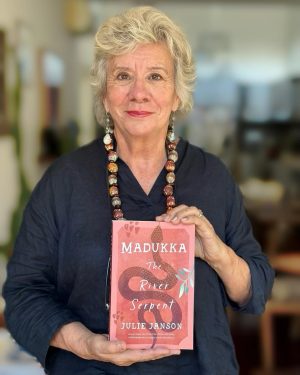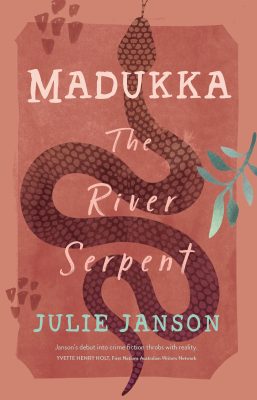Click here to return to the world eco-fiction series
About the Book
I was happy to get the chance to talk with Julie Janson, author of Madukka The River Serpent—an Indigenous crime novel about the mysterious disappearance of a Murri environmentalist, Thommo. The crime is not taken seriously by the police, and the only one who takes action is Aunty June, a Gamilaraay elder. She discovers a host of other corruption while investigating what happened to Thommo, including endemic racism, climate change, water theft, and more. Janson’s scope includes past and future of a 2020 fictional setting in New South Wales. The author connected her upbringing and history with ecological health of the river deeply to the story.
Julie Janson’s crime thriller does so much more than solve a murder: it tackles water rights, Aboriginal disadvantage, racism, environmental vandalism, and massacres as they appear in the everyday experience and conversations of First Nations people. Raw, visceral, rude and tough—it’s the new perspective on Australian noir that we’ve been waiting for.
Chat with the Author
Mary: What was your earlier career like?
Julie: I began teaching in remote Aboriginal communities in the 1970s, I wrote plays with Yolngu children and we performed them with giant puppets and masks.
Mary: How does your experience as a Burruberongal woman of Darug Aboriginal Nation inform your writing, and how do place-writing and ecological concerns find a way in your stories?
Julie: I grew up with my Darug Nation father on the banks of the Lane Cove River in Sydney (Warrane). We fished and set traps for crabs and gathered oysters. My brothers and I slept in caves along the Hawkesbury River. I am always connected to the ecological health of rivers. They are the song lines and homes of spirits like Garangatch and Murrigin on the Derrubbin Hawkesbury River. I write about mostly NSW places, and I was shocked to witness the destruction of the Darling Barka River in western NSW. The drying up of the river due to over pumping of the water for cotton corporations is a crime.
Mary: Your new novel Madukka the River Serpent is a crime novel, which I’m seeing more of these days when it comes to environmental fiction. Can you describe to the readers what’s going on in this book?
Julie: Aunty June is a private investigator who lives in Wilga along the Darling River. She investigates the murder of a young Aboriginal environmentalist and is threatened by bikies and complicit authorities in town. She takes on police incompetence to uncover secrets about her missing relation, Thommo. She is up against racism, water theft, and the antagonism of local police. June may be out of her depth, but nothing will stop her fighting for her people and the land and river.
Mary: The story shows the strong love among family members. Aunty June’s investigation of her nephew Thommo’s disappearance is tied to corruption and racism. Though fiction, how real are these scenarios?
Julie: Racism in Australian towns is ongoing and the police can often be a force for good, but sometimes Aboriginal people are victims of brutality. Corruption can happen in organisations where money is concerned. The local town councillor is suspected of collusion with cotton corporations and is corrupt in his dealings with bikies. Many of Australia’s towns have ongoing racism issues, the response of many people to the need for a YES vote for an Aboriginal and Torres Strait islanders show shows divided we are. Vote YES!
Mary: The Darling River (Paakantyi: Baaka or Barka) is running out of water in both the novel and in reality. Can you talk more about this?
Julie: The Darling River has suffered from over extraction of water for more than 20 years. The ancient Murray Cod and Yellow Belly are almost extinct. Fish die in the millions, and the conservative side of Australian political organisations protects the greedy corporations. As small farmers livelihoods are destroyed, and Aboriginal Dreamings are destroyed, the ecology of the land and water ways are forever changed into drains for water with few living species left.
Mary: Resistance is key to Aboriginal people in your story, which makes the story inspirational. What motivated your strong characters?
Julie: Resistance to colonial invasion is at the heart of the Aboriginal struggle for recognition. We are not going to accept the destruction of land and water and spirit without the ongoing battle for rights to speak for our country. My motivation to write these strong Aboriginal characters comes from years of working beside inspirational Indigenous men and women who fight for their rights and the right of all Australians to have human rights and a flourishing ecological landscape.
Mary: What do you like to read in your spare time, and who are some of your favourite authors?
Julie: I read authors like Nardi Simpson, Annie Proulx, Anthony Powers, Tony Birch, Jack Davis, Eva Johnson, John Steinbeck, and Charlotte Brontë.
Mary: What’s next?
Julie: I am finishing a new historical novel Compassion, which is a sequel to my novel Benevolence, published by Magabala in 2020. The new novel will follow the life of Nell James, who is the daughter of Muraging from Benevolence. The story is in first person and traces Aboriginal resistance in the areas of Sydney, Parramatta, and Newcastle. It is set in 1840 to 1860. Magabala will publish it in 2024.
Mary: Thanks so very much for talking with me, Julie, and for your excellent work in everything you do.
Author Bio

Julie Janson is a published playwright, novelist, and poet of Darug Nation, Burruberongal clan. Her novels include Benevolence, published by Magabala Books 2020 and Harper Collins USA/UK Sept 2021, longlisted for the NIB Literary Award 2020, Voss Literary Award 2021, and Barbera Jefferis Award—and Madukka the River Serpent, publisher UWAP November, 2022, longlisted for the Miles Franklin Award 2023. Her plays include Black Mary, Belvoir St Theatre, Oodgeroo Noonuccal Poetry Prize 2016, and Judith Wright Poetry Prize 2019; Gunjies, nominated for an AWGIE; and The Crocodile Hotel, nominated for the Patrick White Award and Griffin Award. Julie is writing her sequel to Benevolence, titled Compassion, to be published by Magabala 2024. Julie is a qualified university lecturer and English and Drama teacher. B Arts, Dip Ed, M Arts; B Visual Arts.
